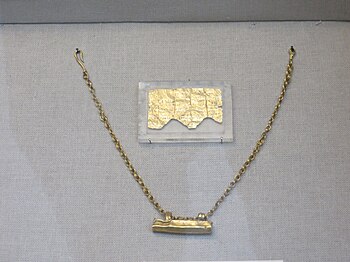Petelia Gold Tablet

The Petelia Gold Tablet (with case and chain) in the British Museum
|
|
| Material | Gold |
|---|---|
| Size | 4.5cm long (tablet) |
| Created | 3rd-2nd Centuries BC (tablet) |
| Present location | British Museum, London |
| Registration | 1843,0724.3 |
The Petelia Gold Tablet or Petelia Tablet is an orphic inscription or totenpass that was found near the ancient city of Petelia, southern Italy in the early nineteenth century. Since 1843, the original has been kept in the British Museum.
In 1830s an inscribed gold tablet was unearthed at the ancient Greek site of Petelia near Strongoli in Calabria. Little is known of the circumstances of the find and its subsequent provenance before it was acquired by the British Museum from the archaeologist and collector James Millingen in 1843.
The small gold tablet is inscribed in ancient Greek with an Orphic saying and dates from between 300-200 BC. The gold case and chain designed to hold it is much later in manufacture, having been made over 400 years later during the Roman times. The ancient Thracian prophet Orpheus, who was often represented as a musician or poet, founded a cult that promised a happy afterlife to the initiated. Many of his temples or shrines were considered oracles by his devotees. The Petelia Gold Tablet probably came from one of his shrines in southern Italy and demonstrates the widespread distribution of orphism in antiquity.
...
Wikipedia
